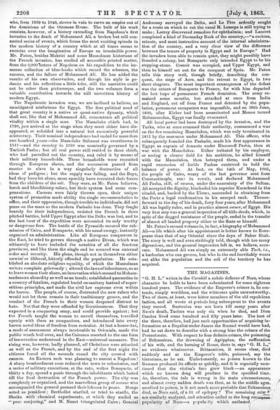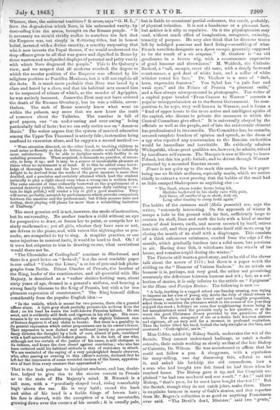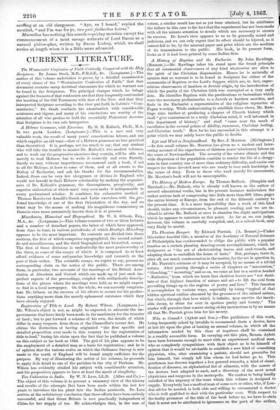THE MAGAZINES.
"G. H. L." writes in the Cornhill a subtle defence of Nero, whose character he holds to have been caluminated for some eighteen hundred years. The evidence of the Emperor's crimes is, he con- tends, simply worthless, and the witnesses quite untrustworthy. Two of them, at least, were bitter members of the old republican faction, and all wrote at periods long subsequent to the events they record. Suetonius was not born till many years after Nero's death, Taeitus was only six when he died, and Dion Cassius lived some hundred and fifty years later. The beat of the three, therefore, had just such opportunities of acquiring in- formation as a Royalist under James the Second would have had, had he sat down to describe with a strong bias the crimes of the Protectorate. With respect to four definite crimes, the poisoning of Britannicus, the drowning of Agrippina, the suffocation of his wife, and the burning of Rome, there is, says "G. H. L.," no evidence whatsoever. Britannicus, it seems clear, died suddenly and at the Emperor's table, poisoned, say the historians, as he sat. Unfortunately, no poison known to the Romans produced its effects so quickly, and it is especially men- tioned that the victim's face grew black—an appearance which no known drug will produce in the specified time. As, therefore, the tale is wrong in its main circumstances, and almost every sudden death was then, as in the middle ages, ascribed to poison, is it not much more probable that Britannicus died, as Nero said, of a fit of epilepsy ? The remaining airy' are similarly analyzed, and attention called to the long cormaa popularity of Nero—a pepula:ity which outlasted,
Whence, then, the universal tradition ? It arose, says" G. H. L.," from the degradation which Nero, in his unbounded vanity, by descending into the arena, brought on the Roman purple. "It is necessary we should vividly realize to ourselves the fact that the Emperor was, not simply in fl ittering titles, but in honest belief, invested with a divine sanctity, a sanctity surpassing that which now invests the Papal throne, if we would understand the deep offence given to all that was grave and dignified in Rome by those wanton and undignified displays of personal and petty vanity with which Nero disgraced the purple." This is De Quincey's
-view, and we suspect that all moderns overlook the degree to which the secular position of the Emperor was affected by his religious position as Pontifex Maximus, but it will not explain all
the facts. It is much more probable that Nero was loved by a class and hated by a class, and that his habitual acts caused him to be suspected of crimes of which, as the murder of Agrippina, be was entirely innocent. James the First may not have ordered the death of Sir Thomas Overbury, but he was a villain, never- theless. The mob of Rome scarcely knew what went on within the palaces, any more that we now know the truth of rumours about the Tuileries. The number is full of good papers, one "on under-eating and over-eating" being particularly full of facts; but we can only notice one on" Amateur Music." The writer argues that the system of musical education among the Upper Ten Thousand is utterly fele-, instruction being confined to execution alone, and he suggests a second method :—
" Were attention directed, on the other hand, to teaching children to read notes as fluently as they do letters, the results would be infinitely more satisfactory. To be able to decipher music with facility is an unfailing possession. When acquired, it demands no practice, of neces- sity, to keep it up; and it may be a source of incalculable pleasure at times when no instrument is at hand. If to this be added some know- ledge of thorough bass, and the laws which govern composition, the delight to be derived from the works of the great masters is more than doubled, and a precision and certainty attained which lead the student naturally to play a right chord even when a wrong one is written down. The same amount of time ordinarily bestowed on the acquirement of a manual dexterity (which, like mahogany, requires daily rubbing to re- tain its high polish,) will render a boy or girl a good musician. They will never, probably, astonish by performances which provoke comparison between the amateur and the professional; but if they possess taste and feeling, their playing will please far more than a scrambling imitation of Thalberg.'
The most genuine evil is not, however, the mode of instruction, but its universality. No mother teaches a child without an eye for perspective to draw, or forces her to paint, or compels her to study mathematics ; yet all girls, whether they have ears or not, are driven to the piano, and, with voices like nightingales or pea- cocks, are compelled to try to sing. A stupider practice, or one more injurious to musical taste, it would be hard to find. Oh! if it were but etiquette to hiss in drawing-roams, what revelations would there not be.
"The Chronicles of Carlingford" continue in Blackwood, and
there is a good letter on "Ireland ;" but the most readable paper is one called "Under the Limes," a se.ies of pen-and-ink photo- graphs from Berlin. Prince Charles of Prussia, the brother of the King, leader of the reactionaries, and all-powerful with His Majesty, is described as a "rather sinister-looking man, about sixty years of age, dressed in a general's uniform, and bearing a strong family likeness to the King of Prussia, but with a far less pleasant expression of countenance." The King himself differs considerably from the popular English idea :—
"In the vehicle, which is meant for two persons, there sits a general officer alone. A light grey cloak partially protects his uniform from the dust ; on his head he wears the well-known Prussian helmet. He sits erect, and is evidently still fresh and vigorous in his old age. His coun- tenance is by no means nnpleasing, although the slightly Calmuck cast of feature deprives it of any claim to beauty. But there is a geniality in its general expression which rather prepossesses one in its owner's favour. That expression is now dashed and saddened (surely no preconceived fancy dictates the thought) by a look o' care, almost of pain, combined with a half-mistrustful, half-defiant glance. It is the look of one who, although not too certain of the justice of his cause, is still obstinate in its defence, and keeps the door closed against conviction ; who also has been irritated until his habitual attitude is that of resistance to attack. We are reminded of the saying of a very quicksighted female observer, who, after passing an evening in this officer's society, declared that he left her the impression of some wounded denizen of the forest, apprehen- sive of hurt from every creature that approached it."
That is the look peculiar to incipient madness, and has, doubt- less, helped to give rise to the stories current in Prussia
as to the state of His Majesty's mind. M. Bismark is a tall man, with a "peculiarly shaped head, rising remarkably high 'above the ear. He is very bald ; round the back and sides of his head is a feeble hinge of brown hair ; his face is shaved, with the exception of a long moustache, growing down over the corners of his mouth ; it is usually pale, but is liable to occasional partial reduesses, the result, probably, of physical irritation. It is not a handsome or a pleasant face, but neither is it silly or repulsive. On it the physiognomist may read, without much effort of imagination, arrogance, audacity, tenacity of purpose. He may also think that be discerns traces
left by indulged passions and hard living—something of -what French novelists designate as a figure ravage'e, generally supposed to be the result of a vie orageuse." M. Grabow is "an old
gentleman in a brown wig, with a countenance expressive of good humour and shrewdness." M. Waldeck, the Catholic Radical, a "tall, meagre, erect old man, with a deeply furrowed countenance, a god deal of white hair, and a collar of white whisker round his face." Dr. Virchow is a man of "dark, keen, expressive features." Von Sybel has "a pale face and weak eyes," and the Prince of Prussia "a pleasant smile,' and a face always misrepresented in photographs. The writer of a capital paper headed "Front Cracow to Warsaw" corrects a popular misapprehension as to the Secret Government. Its com- position is, he says, very well known in Warsaw, and it forms a "kind of upper house to the more active and intelligent spirits of the capital, who discuss in private the measures to which the Central Committee give effect." It is universally obeyed by the officials as well as the people, and of late the aristocratic element has predominated in its councils. The Committee has, he remarks, secured complete freedom of opinion and speech, as the doom of a spy who reported any conversation to the Russian authorities would be immediate and inevitable. He evidently admires Wielopolski, whose great qualities are, however, he admits, ruined by inordinate self-esteem. The Marquis is now at liberty to leave Poland, but this his prido forbids, and he drives through Wersasir protected by a mounted Russian escort.
Fraser is not quite up to the mark this month, the best paper
being one on British molluscs, especially snails, which we notice chiefly to extract a verse proving that the habits of the snail had as little escaped Shakespeare as anything else :—
" The Snail, whose tender horns being hit, Shrinks backward in his shelly cave with pain, And there, all smother'd up in shade, doth sit, Long after fearing to creep forth again."
The habits of the common snail (Helix pomatia) are, says the writer, "extremely interesting. On the approach of winter it scoops a hole in the ground with its foot, sufficiently large to contain its shell, lines and roofs the hole with a kind of mortar
made of dead leaves, earth, and mucus secreted by itself, retires into this cell, and then proceeds to make itself still more snug by closing the mouth of its shell with a diaphragm. This consists of a thick calcareous substance, exuded from the edge o f the mantle, which gradually hardens into a solid mass, but pervious to air. Having done this, it withdraws into the whorls of its house, and remains torpid during the winter."
The Victoria still wants a good story, and to be rid of the clever talk about the actors of 1775; but there is a paper worth the
shilling on the "Humour of Various Nations." As an article on humour it is, perhaps, not very good, the writer not perceiving accurately the difference between humour and wit ; but, as a col-
lection of stories, it is only inferior to the article on " Epigrams" in the Home and Foreign Review.. The following is new :— " A lady, teaching in a ragged school one Sunday evening, was trying to impress on her ease of young city Arabs the duty of thank'ulness to. Providence ; and, to begin at the lowest and most tangible proposition., asked them to mention the pleasures which in the course of the year they enjoyed the most ; holidays on some fine neighbouring downs being in her unsophisticated mind the probable reply to her question, or at the worst the good Christmas dinner provided by the guardians of the schools. The class, composed of ten or a dozen lads between sixteen and eighteen, all sat very still for a moment in profound cogitation. Then the leader lifted his head, looked the lady straight in the face, and answered : Cock-flghtiu', ma'm.' " Miss Cobbe, misled by Sidney Smith, underrates the wit of the Scotch. They cannot understand badinage, or catch a double entendre, their minds working as slowly as that of the late Bishop of Calcutta, Dr. Wilson. He was accustomed to affirm that he could not follow a pun. A clergyman, with a reputation for story-telling, one day discussing this, offered to test it, and asked his lordship the old conundrum, how a
a man who had bought two fish found he had three when he reached home. The Bishop gave it up, and the Chaplain ex- plained "lie had two mackerel and one smelt." "Aim !" said the Bishop, "that's poor, for he must have bought that too! !" But the Scotch, though they do not catch jokes, make them. There is exquisite humour in many of Gait's stories, and this repartee from Mr. Rogers's collection is as good as anything Frenchmen ever said. "The Devil's deal, Minister," said two "gents,"
-scoffing at an old clergyman. "Aye, so I heard," replied the assailed, "and I'm wao for ye, twa pair faitherless bairns."
Macmillan has nothing this month requiring mention except the commencement of a most savage estimate of Lord Bacon as a natural philosopher, written by Baron Liebeg, which we shall notice at length when it is a little more advanced.
































 Previous page
Previous page